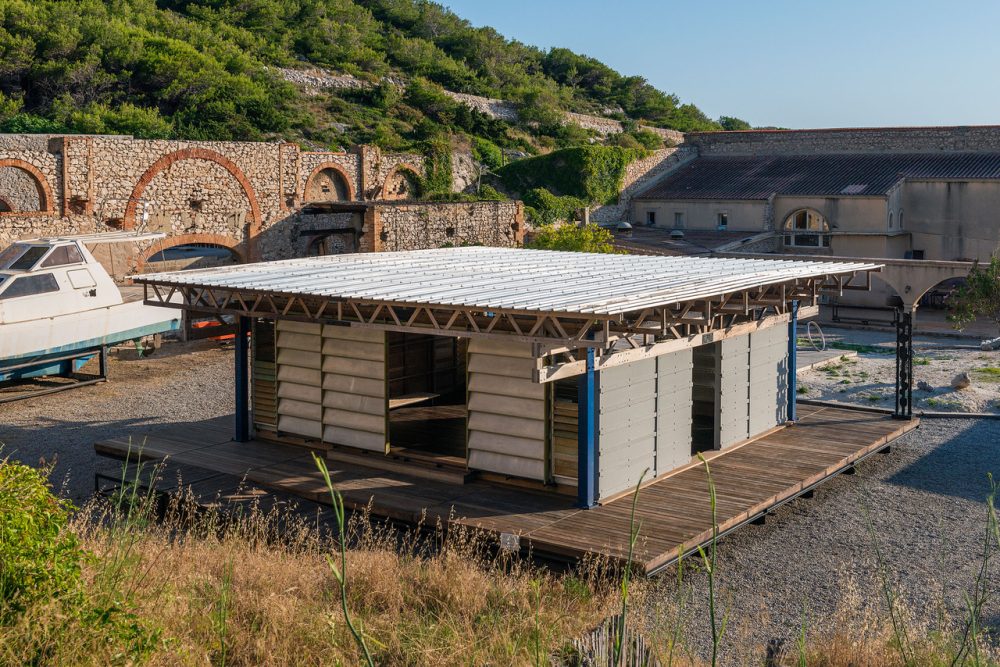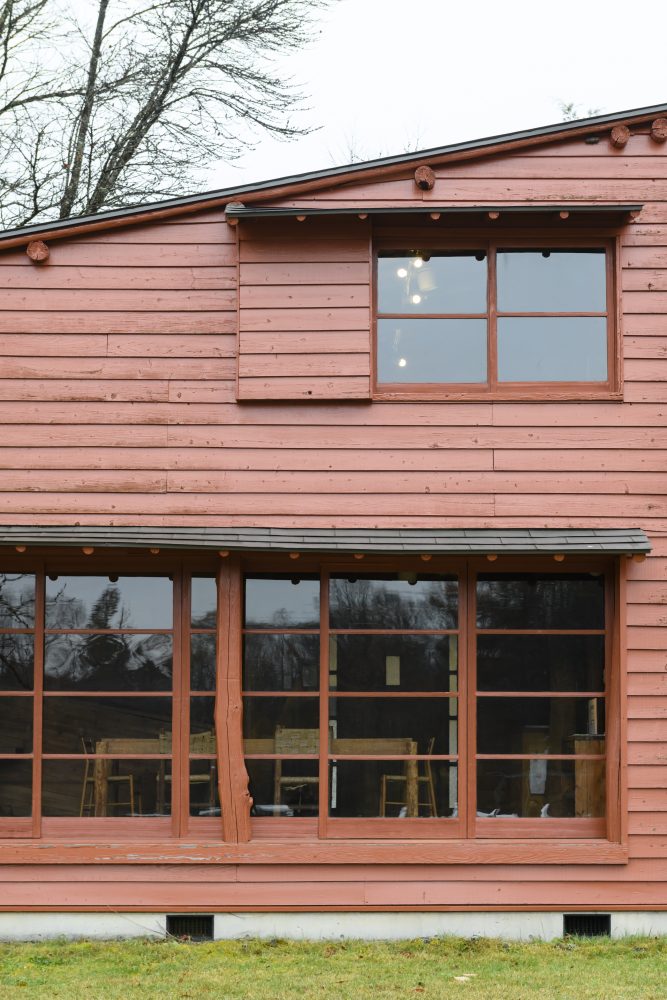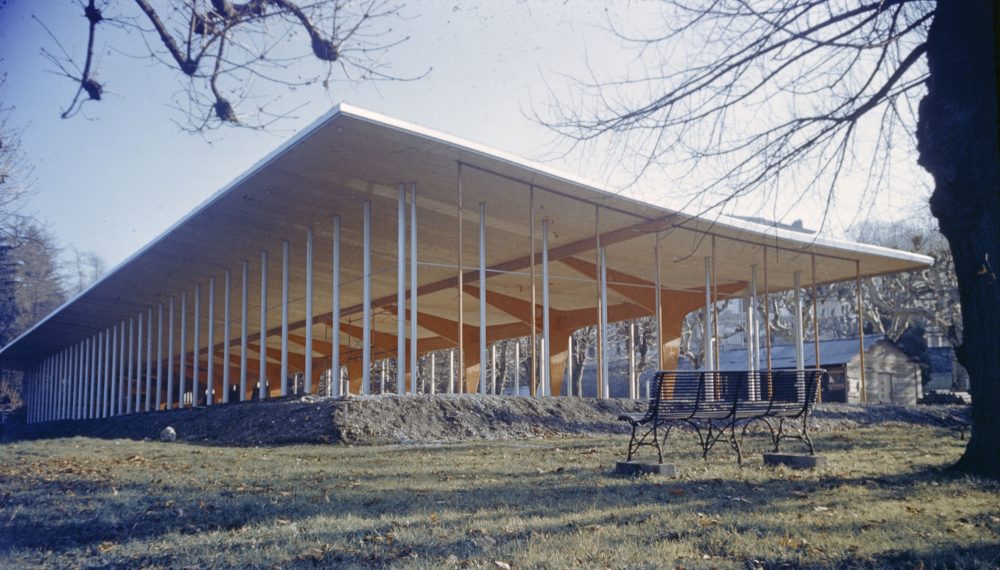
Series Window Terminology à la Carte
Vol. 2: Windows in German
27 Jun 2018
- Keywords
- History
- Literature
Linguist Yasunari Ueda looks into the origins of words that mean “window” from around the world to explore the process through which the concepts of the word have expanded over the ages. Following his analysis of windows in Japanese, in Volume 2 he examines windows in German.
1. Introduction
In German, the equivalent of what we call “mado” [窓, “windows”] in Japanese are referred to as “Fenster”. This word originated from the Latin word “fenestra”, which was introduced into the Germanic cultural region together with Roman architecture during the age of the Roman Empire. (The Latin word “fenestra” has its roots in the Greek word “phàino”, which means “to be made visible, to give light”.) The word “Fenster” has become so deeply embedded in the modern German vocabulary that there are probably few, even among native speakers, who are aware of its Latin roots.
The Germanic peoples originally referred to windows as “Windauge”, which is a word that shares its origins with the English word “window” and has the literal meaning “wind eye”. The German word “Fenster” hence spread as a result of this original word of the substrate language* of Germanic being superseded by the foreign word from the Latin linguistic/cultural area. How has this historical fact influenced window-related linguistic cultural phenomena in the German linguistic area? This is the point that I will be exploring in this piece.
*substrate language: Language originally spoken by the people of a conquered region that continues to have an influence even after it is superseded by the language of the conquerors.
2. Windauge (Germanic)
According to Tacitus’ Germania, the ancient Germanic peoples built houses using soft materials such as wood, straw, and mud. Unlike Roman buildings that employed prepared hard materials such as cut stone and brick, they were simple constructions that placed importance on providing shelter from the cold and escaping the threat of enemies.
As can be deduced from the origins of their words for “window”, the ancient Germanic peoples and Latin peoples perceived windows differently. Windows in Roman architecture were openings, or holes, made in solid masonry partition walls and ramparts. In contrast, the ancient Germanic peoples built simple houses by filling the gaps between wooden columns with woven reeds. It is difficult to think that their houses provided them with full protection from the cold of the Scandinavian region that they inhabited. Indeed, considering how they named windows “Windague” [“wind eyes”], the cold air that the windows brought inside must have made a far greater impression than their uses in admitting light and providing ventilation.
3. Fenster (German)
—An Element of a New Culture (Architectural Style) Introduced into the German Linguistic Area
As mentioned earlier, “Fenster” is a well-established word in the German language. There are also compound words and idioms that contain the word “Fenster”.
In terms of words, “Bogenfenster” [“arched window”], “Sprossenfenster” [“mullioned window”], and “Fensterangel” [“window hinge”] are words that are listed in the German dictionary Duden – Deutsches Universalwörterbuch (2013) but not in previous editions.
Examples of idiomatic expressions include “aus dem hohen Fenster blicken” [lit. “look out from a high window”], which is used to say that someone is haughty or arrogant, and “Beim mittleren Fenster stehen” [lit. “stand in the middle window”], which means “to live a modest lifestyle”. These are idioms that were born after the introduction of Roman culture. We know this because they describe windows not of single-story buildings but of multi-story buildings. Their meanings are based on the fact that common people could not live in lavish castles or mansions with multiple floors. The expressions illustrate how, over time, houses came to be perceived as having not only useful value in providing living spaces but also added value in expressing wealth and social status.
The phrase “das Geld zum Fenster hinauswerfen” [lit. “throw money out the window”] is used with the meaning “to spend wastefully”. In Japan, we would say “溝に捨てる” [dobu ni suteru, lit. “throw in the gutter”], but in Germany, where most streets were paved in stone, gutters were normally covered. The inside and outside of houses were completely separated, and the only contact points with the outside world were the windows, which were built solidly to prevent the intrusion of enemies. Hence, if people wanted to discard something, they did not need to go outdoors; rather, they could just throw it directly out the window.
―Vestiges of Ancient Germanic Windows
There are some proverbs that contain the word “Fenster” and yet seem to suggest Germanic ideas of windows.
Take the saying “Große Fenster zieren’s Haus” [lit. “big windows adorn the house”], for example. It is listed with an explanatory note that reads “Von Große Augen” [“from ʻbig eyes’”]. This view that likens windows set in the wall of a house to human eyes seems to be that of the ancient Germanic peoples, who referred to windows as “wind eyes”.
The saying “Ein Fenster auf, macht gesunden Lebenslauf” [“open the windows for a healthy living”] advises people to bring fresh air into their bedrooms and living rooms. The original Latin saying listed with it is “Fenestram aperi ab oriente et aquilone, meridianam et occiduam claude” [“open the east and north windows and close the south and west windows”]. This Latin proverb advises people to keep out the hot air blowing in from the south and west and to let in the cool air from the east and north. It turned into the German saying advocating the importance of ventilation when it was adapted to the northern climate. In actuality, people in cold Germany seal their rooms because they abhor cold drafts. “Es zieht” [“it’s drafty”] is like an everyday expression among Germans, and if uttered by someone in the same room, it is understood as a request to close the windows. This speaks of how sensitive people are about outside air entering a room. However, if one seals a room, the air will stagnate. This explains why it became necessary to have a special reminder about the importance of ventilating rooms.
4. Folk Beliefs and Superstitions Regarding Windows
According to the Handwörterbuch des deutschen Aberglaubens [Concise dictionary of German superstitions], folk beliefs and superstitions regarding windows are associated particularly closely with spirits.
Windows are considered to be holes from which souls fly out (when someone passes away, the windows are opened to allow the soul of the deceased to depart) and places where spirits linger (the souls of the dead are believed to knock on the windows at night). They are also where various rites and mystic rituals are performed (on New Year’s Eve, people share drinks from a cup and then throw it out the window). It is also believed to be dangerous to exit or enter through a window. Furthermore, windows are thought to have the power to cure disease (eye pains can be healed by rubbing condensation from the window on the area around the eye) and to prevent misfortunes (Saint John’s wort is affixed to windows to prevent lighting strikes).
These folk beliefs perceive the houses as bodies within which life and spirits dwell. Windows are likened to human eyes, and they are seen to play an important role in avoiding misfortunes because they are contact points with the outside world where phantoms and evil spirits wander.
5. Conclusion
The borrowing of the word “Fenster” and incorporation of Latin phrases into the German language has influenced even the way in which German speakers think. However, when we look at German proverbs and folk beliefs, we can still find traces of the way people perceived the world during the time when the Germanic word “Windauge” was used. Once something has been incorporated into the realm of thought of a group of people, it has the tendency to continue to be handed down as a cultural asset within their collective memory and to affect the way they think and behave. One may be able to make some interesting discoveries by giving consideration to this point when observing the future evolution and development of buildings and windows in the German linguistic area.
References
・Bächtold-Stäubli (Hrsg.), Handwörterbuch des deutschen Aberglaubens. Berlin/New York: Walter de Gruyter, 1987 (Taschenbuchausgabe).
・Horst und Annelies Beyer, Sprichwörterlexikon. Sprichwörter und sprichwörtliche Ausdrücke aus deutschen Sammlungen vom 16. Jahrhundert bis zur Gegenwart. München: Verlag C.H. Beck, 1987.
・Duden – Deutsches Universalwörterbuch. Herausgegeben von der Dudenredaktion. Mannheim/Zürich. (Die 1. Auflage 1983, 3. Auflage 1996, 7. Auflage 2011)
・Duden Redewendungen und Sprichwörtlichen Redensarten. Wörterbuch der deutschen Idiomatik. Bearbeitet von Günther Drosdowski und Werner Scholze-Stubenrecht. Nach den Regeln der deutschen Rechtsschreibung überarbeiteter Nachdruck der 1. Auflage. Mannheim/Leipzig/Wien/Zürich: Dudenverlag.
・Duden Redewendungen. Wörterbuch der deutschen Idiomatik. Herausgegeben von der Dudenredaktion. Mannheim/Leipzig/Wien/Zürich. (Die 2. Auflage 2002, 4. Auflage 2013) (DUDEN BAND 11)
・Heinz Küpper, Wörterbuch der deutschen Umgangssprache. Stuttgart: Klett, 1987.
・Klaus Müller (Hrsg.), Lexikon der Redensarten. München: Bertelsmann Lexikon Verlag, 1994.
・Lutz Röhrich, Lexikon der sprichwörtlichen Redensarten. Freiburg/Basel/Wien: Herder, 1994. (Taschenbuchausgabe)
・Rolf Selbmann, Eine Kulturgeschichte des Fensters von der Antike bis zur Moderne. Berlin: Dietrich Reimer Verlag, 2010.
・Tacitus, Publius Cornelius. 1979. Germania. Translated by Hisanosuke Izui. Tokyo: Iwanami Shoten.
・Karl Friedrich Wilhelm Wander, Deutsches Sprichwörter-Lexikon. Ein Hausschatz für das deutsche Volk. Augsburg: Weltbild Verlag GmbH, 1987. (Unveränderter fotomechanischer Nachdruck der Ausgabe Leipzig 1867)
Yasunari Ueda
Born 1948 on the island of Tokunoshima in the Oshima District of Kagoshima, Japan. Graduated from the Department of Philosophy in the Faculty of Letters of Kobe University and received a master’s degree from the Hiroshima University Graduate School of Letters. Taught as a teaching assistant and lecturer at the Faculty of Humanities of Chiba University, an assistant professor at the College of General Education of Kyushu University, and an assistant professor at the School of Letters of Hiroshima University before becoming a professor at the Graduate School of Letters of Hiroshima University in 2001 (retired in 2013). Doctor of Letters. Specialist of modern German studies. Known particularly for his research on Japanese and German idioms, the linguistic theories of Karl Bühler (1879–1963), German sociolinguistics, and applied linguistics (foreign language education). Currently working on making proposals for vocabulary learning based on the findings of his comparative research on Japanese and German idioms.

MORE FROM THE SERIES
-

Window Terminology à la Carte
Windows in the Tokunoshima, Amami Region: Boma Shimaguchi Dialect
26 Sep 2022

Window Terminology à la Carte
Vol. 6 : Window Culture Studies—Towards Further Linguistic Explorations
18 Dec 2018

Window Terminology à la Carte
Vol. 5: A Contrastive Linguistic Analysis of Words for “Window”—Based on Comparative Analyses of Japanese, German, English, and Italian Idioms
27 Nov 2018

Window Terminology à la Carte
Vol. 4: Windows in Italian
11 Sep 2018







